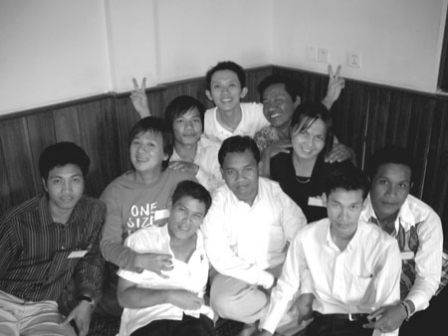Greater Mekong MSM Network Launches Activities Across Region
February 2007—A new network of groups serving men who have sex with men (MSM) across the Greater Mekong Subregion—the Purple Sky Network—has been launched to strengthen the groups’ collaborative work against HIV/AIDS.
In recent years, the Greater Mekong Subregion—Cambodia, China’s Yunnan and Guangxi provinces, Laos, Myanmar, Thailand, and Viet Nam—has seen a rise in the number of HIV-positive MSM. The Purple Sky Network was conceived to help fight that development, and TREAT Asia was chosen last year to serve as the network’s Regional Coordination Secretariat.

Members of the Purple Sky Network gathered for the group's first regional meeting in Bangkok at the end of the summer. (Photo: Dredge Kang)
|
Purple Sky’s first regional meeting, held in Bangkok in August 2006, attracted more than 60 attendees, including 40 representatives of MSM groups and more than 20 participants from governments, nongovernmental organizations (NGOs), and community groups. Participants shared experiences and ideas, and received practical information about working against HIV with MSM communities.
Following the Bangkok meeting, an in-country workshop was held in Kunming, China, 3–5 November. More than 50 participants attended from Yunnan’s MSM community groups, provincial and local governmental organizations such as the Yunnan and Kunming Centers for Disease Control and Prevention, and from international NGOs, including TREAT Asia, Family Health International, USAID/Health Policy Initiative, and the Global Fund.
The goals of the three-day workshop in Kunming included sharing information about the state of HIV prevention among MSM in Yunnan, a province that is notable both for having the highest level of HIV infection in China and for the comprehensive and cooperative approach to fighting the epidemic displayed by government, community, and NGOs. Participants also drafted a provincial-level strategic framework for MSM interventions and formed a technical working group to track implementation of that framework.
Although the challenges faced by those working with MSM and HIV in the Greater Mekong Subregion remain daunting, the landscape has begun to change for MSM. “It has been an incredible journey to go from having so few HIV interventions among MSM only 18 months ago,” noted one meeting attendee, “to having all the activity we have heard about.”
Laos and Myanmar are planning similar in-country meetings to be held in early 2007.